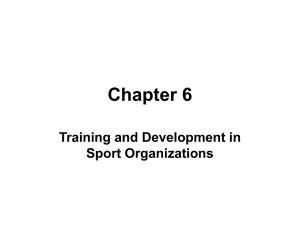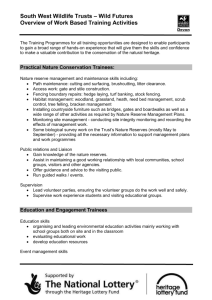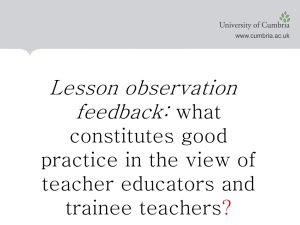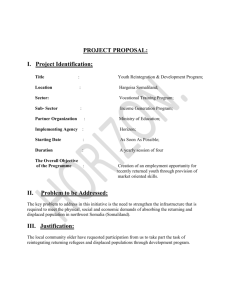School Direct Programme Overview
advertisement
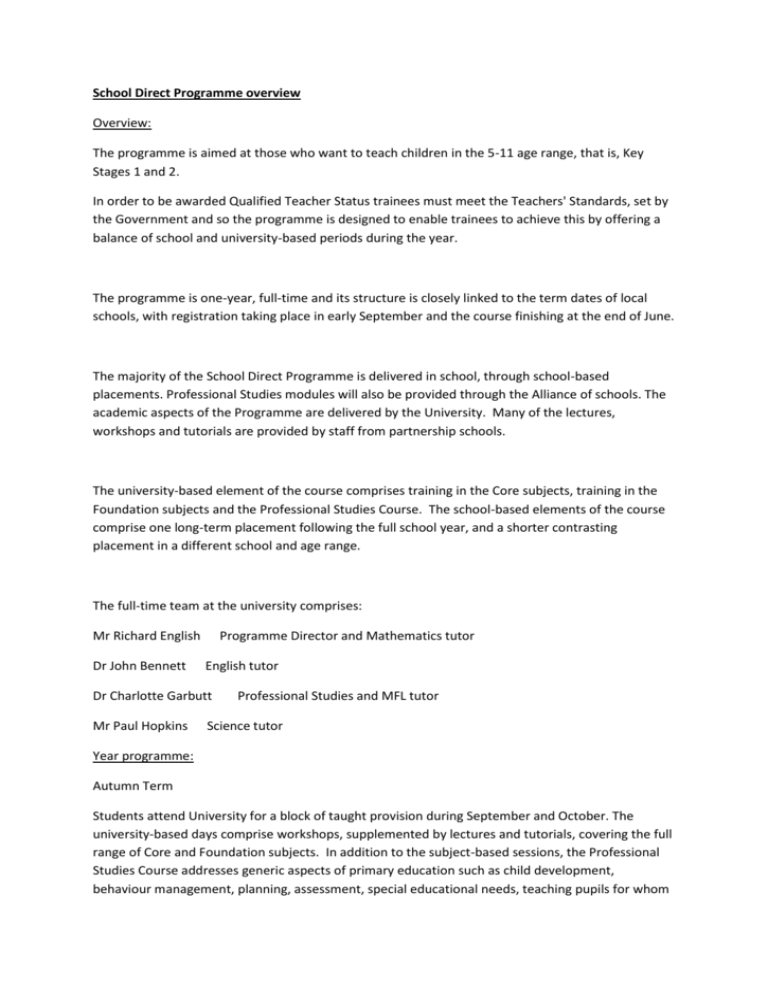
School Direct Programme overview Overview: The programme is aimed at those who want to teach children in the 5-11 age range, that is, Key Stages 1 and 2. In order to be awarded Qualified Teacher Status trainees must meet the Teachers' Standards, set by the Government and so the programme is designed to enable trainees to achieve this by offering a balance of school and university-based periods during the year. The programme is one-year, full-time and its structure is closely linked to the term dates of local schools, with registration taking place in early September and the course finishing at the end of June. The majority of the School Direct Programme is delivered in school, through school-based placements. Professional Studies modules will also be provided through the Alliance of schools. The academic aspects of the Programme are delivered by the University. Many of the lectures, workshops and tutorials are provided by staff from partnership schools. The university-based element of the course comprises training in the Core subjects, training in the Foundation subjects and the Professional Studies Course. The school-based elements of the course comprise one long-term placement following the full school year, and a shorter contrasting placement in a different school and age range. The full-time team at the university comprises: Mr Richard English Dr John Bennett Programme Director and Mathematics tutor English tutor Dr Charlotte Garbutt Mr Paul Hopkins Professional Studies and MFL tutor Science tutor Year programme: Autumn Term Students attend University for a block of taught provision during September and October. The university-based days comprise workshops, supplemented by lectures and tutorials, covering the full range of Core and Foundation subjects. In addition to the subject-based sessions, the Professional Studies Course addresses generic aspects of primary education such as child development, behaviour management, planning, assessment, special educational needs, teaching pupils for whom English is an additional language, and so on. Again, this comprises workshops and lectures, many of which are provided by local teachers and headteachers. Following the initial blocks, trainees spend the rest of the term in schools complementing the university-based sessions by providing opportunities to work with children and to meet with experienced teachers to explore a wide range of key issues. Trainees are expected to take increasing responsibility for teaching groups or whole classes of pupil. Trainees build up to this workload gradually. Spring Term During the Spring Term trainees undertake a contrasting 6-week teaching placement in another school within the Alliance. This will offer a very different experience, usually with another age group of pupils. The whole-class teaching load is expected to be around 60-65% encompassing a range of subjects. A block placement at the university takes place in March and comprises workshops, lectures and tutorials, in a similar fashion to the autumn term. Summer Term During the summer term trainees return to their original placement Again, they are expected to teach whole classes of pupils across a range of subjects, but with a slightly increased workload of 7075%. Trainees return to the university on the final day of the course to discuss their NQT Profile with their personal supervisors. This provides each trainee with targets to take into the first year of teaching as a Newly Qualified Teacher (NQT). Core subjects: English The course prepares trainees to confidently and effectively teach English in primary schools using a variety of strategies which can be applied in different types of schools. This takes full account of the stages of children's development and key aspects of learning in relation to reading, writing, speaking and listening. The course covers the requirements of the National Curriculum, but is wide ranging in order to take account of varied curriculum approaches. Some of the English sessions include small-group work with children in order to put the theoretical elements of the course into practice. The teaching and learning of reading is a central feature of the course, with particular emphasis on the national priority area of systematic synthetic phonics. Trainees examine teaching and learning strategies relating to developing writing skills, including work on the teaching of spelling, grammar and punctuation. Attention is also given to the essential area of speaking and listening. Trainees develop their own knowledge about language in a variety of ways throughout the course. In their placement schools, trainees undertake tasks related to teaching, learning and assessing reading, writing, speaking and listening. They also undertake a study of systematic synthetic phonics and consider the use of children's literature in the classroom. Mathematics The course has two main aims: first, to increase trainees' levels of confidence with regard to their own mathematical ability, and, second, to provide trainees with the necessary knowledge, skills and understanding to teach mathematics effectively in the primary school. These two aims are interlinked and so every mathematics workshop addresses both subject knowledge and pedagogy. Both of these main aims are addressed by adopting a very practical, 'hands-on' approach to mathematics; that is, trainees will spend much of their time engaged in a wide range of mathematical activities. These will cover all areas of the subject, but there will be a particular emphasis on numeracy. There will also be an examination of the theoretical basis upon which the various aspects of mathematics teaching are based, and there will be constant reference to research findings and recent HMI/Ofsted reports on the teaching of the subject. Trainees will be required to complete a number of coursework assignments. These will be largely school-based and will involve designing, planning, preparing and teaching various mathematical activities, together with some reflection on and analysis of the adopted approaches. Science Science in primary schools should be creative, imaginative, investigative and fun! The course is built around co-operative, creative practical work in order to develop trainees' own knowledge and understanding of science, and the pedagogical skills best suited to facilitating children's effective learning of science in the classroom. The workshops sessions, together with private study and the completion of school based reflective assignments are all seen as important in developing the trainee to become an effective practitioner, with the principal aim being to facilitate children's active learning, engagement and progression in scientific knowledge and understanding. The course is built around three key axioms: that children undertake real science, that this is done in an investigative way and that we develop models of understanding that can be developed and enriched as the child progresses. You will be encouraged to reflect on your learning through the eyes of the child, the teacher and the pedagogue. As well as the taught sessions you will be expected to work independently supported by provided resources to develop your own science knowledge. Foundation Subjects: Workshops are provided which cover all of the foundation subjects: art, design and technology, geography, history, information technology, modern foreign languages, music, physical education and religious education. Four half-day sessions are provided for each subject during the year and most tutors are teachers and headteachers in local schools who possess wide-ranging experience and expertise in their fields. Each tutor aims to provide trainees with the necessary subject and pedagogical knowledge to teach that subject effectively in primary schools. Professional Studies: Primary teachers need an understanding of a wide range of general issues related to the profession, to children and to the world beyond the classroom. These are considered in a programme of workshops, school visits, lectures and associated tutorial sessions throughout the year. Topics covered include child development; special educational needs; classroom organisation and management; behaviour management; planning, assessment and record-keeping; teaching pupils for whom English is an additional language; working with classroom assistants; co-operative learning; multicultural education; and PSHE and citizenship. Trainees are assigned a personal supervisor with whom they have regular group tutorials which focus on the topics covered in the Professional Studies Course. All of the personal supervisors are experienced headteachers and so are ideally placed to provide high-quality insight and support. In addition to the group tutorials each trainee meets with his or her supervisor individually on a number of occasions during the year to review progress and set targets. Teaching placements: Trainees undertake two periods of teaching; one that is long-term, lasting throughout the entire academic year, and a contrasting one in another school in the spring term. The aim is to give every trainee a wide range of experience, encompassing pupils of different ages and schools of different size and type. We work in partnership with the 15 primary schools in the STAR Alliance, ranging from small, rural schools with approximately 50 pupils to large urban schools with over 450 pupils. We do try to take account of trainees' personal circumstances when organising placements, but the prime objective is always to provide a range of experiences, thus equipping trainees to teach competently in any type of school. For each teaching placement, trainees are assigned a School Direct tutor who offers support and guidance before and during the placement. This complements the role of the school mentor, who is able to monitor and assist the trainees' development on a day-to-day basis. School Direct tutors and school mentors work closely in partnership with one another to ensure the best possible outcomes for all trainees. During the year trainees will have the opportunity to teach all primary curriculum subjects, with an emphasis on English and mathematics. The overall teaching load for the autumn placement rises to 60-65%, with an increase in the summer to 70-75%. This provides a firm basis for the 80% teaching load during the NQT year. Assessment: The teaching placement periods are assessed in relation to the Teachers' Standards which encompass all aspects of the trainee's work in school, for example planning, preparation, teaching, assessment, record-keeping and involvement in the wider life of the school. University tutors and school mentors are jointly responsible for the assessment of trainees in relation to the Teachers' Standards during placement periods.
